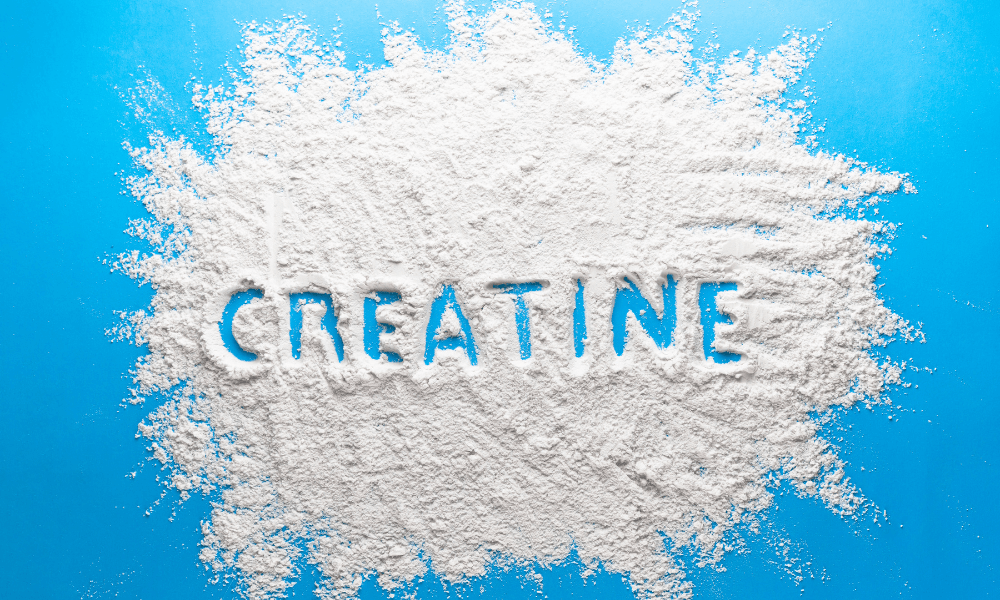Latest posts
Magazine
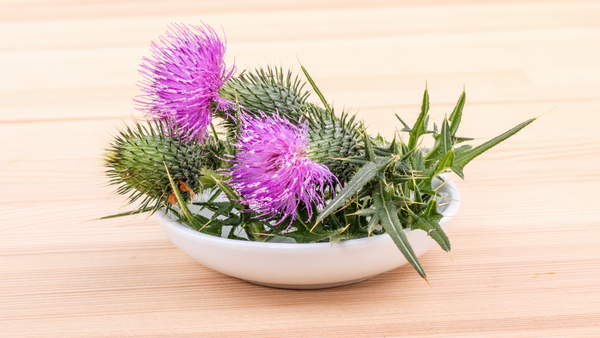
Liver regeneration: What really helps?
The liver is a central metabolic organ. It has important functions in sugar, fat and protein metabolism. The liver is also the body's detoxification center.
Unfortunately, the liver is under a lot of strain these days: too much alcohol, fructose, toxins and medication damage the liver and can cause fatty liver.
Fatty liver disease is considered a widespread disease: around a third of adults are affected by it. [1] A fatty liver has dramatic consequences for health. It is a source of inflammation, causes bad cholesterol and blood fat levels and increases the risk of cardiovascular disease and diabetes . Unfortunately, fatty liver disease and other liver damage are not diagnosed and recognized in many cases.
Fortunately, the liver has a very high regenerative capacity. Liver damage can often be reversed by changing your diet. Secondary plant substances can also help here.
Milk thistle – liver protection and bile flow
Milk thistle belongs to the Asteraceae family. It is considered a medicinal plant for the liver and is often used in detoxification treatments and therapeutic fasting.
A component of milk thistle, silibinin, protects the liver from the deadly poison of the death cap mushroom. If the mushroom is accidentally consumed, silibinin is administered intravenously in high doses. [2]
Milk thistle consists of 1 – 3% silymarin, 20 – 30% fat and 30% protein. It also contains mucilage and other secondary plant substances.
Silymarin is a flavonoid complex consisting of silibinin, silychristin and silydianin.
Milk thistle is said to have a positive effect on the liver. It is said to be able to stabilize liver cells and protect the liver from oxidative stress. This is said to counteract the oxidation of fats in the liver. Oxidized fats are very harmful and promote inflammation. Milk thistle is also said to stimulate protein formation and thus encourage liver regeneration.
Milk thistle is also said to be able to stimulate the flow of bile by promoting the production of bile in the liver and the emptying of the gallbladder. Bile is important for the digestion of fats.
Artichokes – fat digestion and protection against fatty liver
Artichokes are very rich in flavonoids and bitter substances such as cynarin. They are said to promote bile flow and thus fat digestion. Artichokes are also considered to be a natural cholesterol-lowering agent.
Artichokes are also said to protect liver cells and promote liver regeneration. They are also used to detoxify the liver.
There is evidence that artichoke extract may counteract fatty liver disease. [3]
In a study on rats, artichoke extract also appeared to protect against liver damage caused by paracetamol. [4]
Alpha-lipoic acid – oxidative protection
Alpha-lipoic acid is an important antioxidant in the body that captures free radicals and counteracts oxidative stress. The body stores alpha-lipoic acid primarily in the liver and brain.
Alpha-lipoic acid is used to generate energy in the mitochondria, the power plants of the cells. It is also said to protect tissue and cells from oxidative stress and promote detoxification. There is evidence that alpha-lipoic acid can also bind and detoxify heavy metals.
Some studies suggest that alpha-lipoic acid may counteract fatty liver and inflammation in the liver. [5]
Dandelion for liver cleansing
Dandelion is often used in liver cleansing. It is also said to stimulate the production of bile in the liver.
Due to its antioxidant effect, dandelion can probably also counteract oxidative stress in the liver.
Choline – maintaining liver function and lipid metabolism
Choline was once considered a vitamin until it was discovered that the body can produce it itself from the amino acid methionine. However, scientists believe that the body's own production is not sufficient and that it is necessary to consume additional choline through food. Choline is found primarily in egg yolks, fish and pork.
The European Food Safety Authority (EFSA) recommends a daily intake of 400 mg of choline for adults. [6]
The body stores choline primarily in the liver and kidneys. There it is present either as free choline or in the choline compound phosphatidylcholine. Phosphatidylcholine is a fat-like compound and an important component of cell membranes. The "shells" that surround our cells and hold them together.
The liver consists of many cells and choline appears to be important for the regeneration of liver cells. Choline also has important functions in the liver's fat metabolism. In this way, it can probably counteract fatty liver disease.
The European Food Safety Authority confirms the following effects of choline in its Health Claims Regulation: [7]
Choline contributes to normal homocysteine metabolism (homocysteine is a cell poison that is suspected of promoting cardiovascular diseases).
Choline contributes to normal fat metabolism.
Choline contributes to the maintenance of normal liver function.
Inositol – vitaminoid that protects the liver
Inositol used to be considered a B vitamin. Today it is considered a vitaminoid, i.e. a vitamin-like substance. This means that the body can produce it in small quantities, but it still makes sense to consume it through food.
Inositol has important functions in fat and hormone metabolism. It is mainly produced in the kidneys and liver. At the same time, it also seems to have a liver-protective function: a deficiency in inositol is suspected of increasing the risk of fatty liver. [8]
Wormwood – remedy for liver diseases
Wormwood has been used in traditional medicine for centuries. It is rich in phytochemicals such as terpenes, coumarins, flavonoids and essential oils.
Wormwood is said to have anti-inflammatory properties and is recommended as a remedy for liver diseases. It is also said to be able to support the liver in detoxification. It is also believed that wormwood can help regulate fat metabolism and thus counteract fatty liver disease.
The plant is also said to have a detoxifying function and is used to treat lead poisoning.
Bamboo shoots for a healthy liver
Bamboo shoots are often used in Asian cuisine. They are valued not only for their taste, but also for their numerous nutrients. Bamboo shoots are very rich in B vitamins , vitamin E, magnesium and calcium . They also contain a lot of fiber, which is said to have a positive effect on the intestinal flora and health.
There is also evidence that bamboo shoots may promote liver health.
In a study on mice, fiber from bamboo shoots appeared to counteract fatty liver disease. [9] In addition, cholesterol profiles improved and triglycerides (blood fat levels) decreased, suggesting that bamboo shoots may have a positive effect on liver fat metabolism.
Liver Complex Daily Capsules by Viktilabs
The Liver Complex Daily capsules combine all of the above-mentioned substances: milk thistle, artichoke extract, alpha-lipoic acid, dandelion, choline, inositol, wormwood and bamboo shoots. The preparation is of the highest quality: it is developed in Germany according to the highest quality standards and is free of unnecessary additives such as binding agents, separating agents, colorants and sweeteners, as well as preservatives.
So that you can convince yourself of our product, we would like to offer you a 15% voucher for our LIVER COMPLEX DAILY .
Simply copy the voucher code “LEBKOM15+V” and paste it at checkout.
Click here for the product
[1] https://www.deutsche-leberstiftung.de/presse/pressemappe/leberkrankenen/fettleber/
[2] https://www.deutsche-apotheker-zeitung.de/daz-az/1998/daz-38-1998/uid-3980
[3] https://onlinelibrary.wiley.com/doi/10.1002/ptr.6073
[4] https://www.researchgate.net/publication/329505679_Hepatoprotective_activity_of_Artichoke_Cynara_scolymus_against_Paracetamol_toxicity_in_female_rats
[5] https://file.scirp.org/pdf/OJGas_2014051613330305.pdf
[6] https://www.efsa.europa.eu/en/press/news/160817
[7] https://www.efsa.europa.eu/en/efsajournal/pub/2056
[8] https://pubmed.ncbi.nlm.nih.gov/33153126/
[9] https://pubmed.ncbi.nlm.nih.gov/33929470/
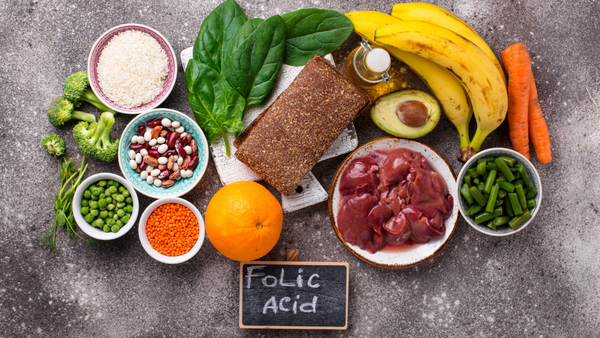
Folic acid: A vital nutrient that should not be missing (during pregnancy)
Folic acid is an essential nutrient that we must consume through our diet. If we do not consume enough folic acid, deficiency symptoms and long-term health problems will occur.
Here you will learn why folic acid is so important, how to recognize a deficiency, and how you can meet your folic acid needs.
Why is folic acid important?
Folic acid is one of the B vitamins , it is also known as vitamin B9. This means that folic acid is one of the water-soluble vitamins.
Folic acid has important functions in cell division and blood formation. It is involved in the production of DNA. DNA must be duplicated before each cell division.
Folic acid is also important for the development of the nervous system.
Folic acid also plays an important role in homocysteine metabolism . Homocysteine is a toxic metabolic product and folic acid is involved in the conversion of homocysteine into the amino acid methionine. A folic acid deficiency can therefore lead to increased homocysteine levels. [1]
The European Food Safety Authority confirms the following effects of folic acid in its Health Claims Regulation:
helps reduce tiredness and fatigue
contributes to normal psychological function
contributes to normal blood formation
contributes to normal amino acid synthesis
contributes to normal homocysteine metabolism
has a function in cell division
contributes to the growth of maternal tissue during pregnancy
Folic acid daily requirement
According to the German Nutrition Society (DGE), the daily folic acid requirement for adults is 300 µg. Pregnant and breastfeeding women have an increased need: pregnant women need 550 µg daily, breastfeeding women 450 µg. [2]
Unfortunately, most Germans do not consume enough folic acid. The National Consumption Study found that women consume an average of 184 µg of folic acid per day, while men consume 207 µg. [3]
Symptoms: How to recognize a folic acid deficiency
A folic acid deficiency is manifested by the following symptoms:
Exhaustion and fatigue
paleness
Difficulty concentrating
Increased susceptibility to infection
Mood swings and depression
Loss of appetite
However, these symptoms are non-specific. This means that they can have many causes and do not clearly indicate a folic acid deficiency. To determine a folic acid deficiency, the folate concentration in the blood serum must be determined.
Caution : During pregnancy, a folic acid deficiency can cause neural tube defects and malformations in the unborn child. To prevent a deficiency, the DGE recommends taking 400 µg of folic acid daily at least 4 weeks before the planned pregnancy and during the first trimester of pregnancy. [4]
Foods containing folic acid
Liver, legumes, seeds and green leafy vegetables are particularly good sources of folic acid. The following table shows the 10 best sources of folic acid: [5]
Groceries
Folic acid content ( µg/100 g)
% of the recommended daily allowance (RDA) [6]
Chicken liver
588
294
Chickpeas
577
289
Sunflower seeds
273
137
Peanuts
240
120
Wakame seaweed
196
98
spinach
194
97
Quinoa
184
92
avocado
89
45
Eggs
71.4
36
asparagus
52
26
Folic acid as a dietary supplement
If the need for folic acid cannot be met through food, a folic acid supplement is advisable.
Folic acid can be present in various forms. The active form 5-methyltetrahydrofolate (5-MTHF) is particularly important in metabolism. Many people have a genetic mutation that means that folic acid cannot be converted into 5-MTHF. You should therefore make sure that food supplements contain 5-MTHF. This is especially important if you are trying to have children or are pregnant.
A daily dose of 400 µg 5-MTHF is recommended for women who wish to have children and pregnant women in the first trimester.
When it comes to folic acid supplements, you should also make sure that they are free of unnecessary additives such as binding, separating and gelling agents, artificial preservatives, colorings and sweeteners.
Viktilabs folic acid is of the highest quality and purity and is developed in Germany.
To support you on your way to a healthy folic acid supply, we would like to offer you a 15% voucher for our folic acid capsules.
Simply copy the voucher code “FOL15+V” and paste it at checkout.
Click here for the product
[1] https://www.ncbi.nlm.nih.gov/books/NBK554487/
[2] https://www.dge.de/forschung/referenzwerte/folat/?L=0
[3] https://www.dge.de/forschung/faqs/folat/
[4] https://www.dge.de/forschung/referenzwerte/folat/?L=0
[5] https://nutritiondata.self.com/foods-000112000000000000000.html
[6] https://pharma-kodex.de/wp-content/uploads/2021/08/Verregulation-EU-Nr.-1169-2011-Anhang-XIII-Stand-18.11.2014.pdf
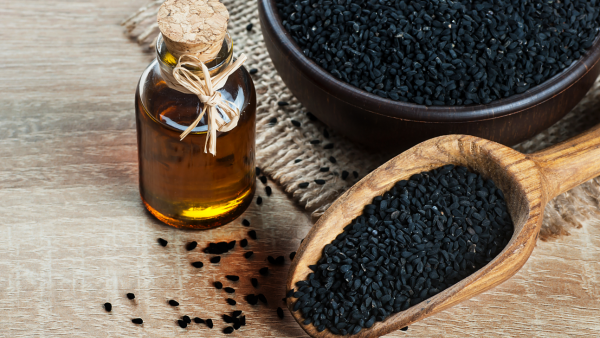
Black cumin oil: How effective is it for allergies, hay fever, etc.?
Black cumin oil has long been considered a traditional remedy. It is said to not only relieve hay fever, but also reduce high blood pressure and even help with infertility.
In this article you will learn what black cumin oil is and how it works.
What is black cumin seed oil?
Black cumin oil is obtained by pressing real black cumin ( Nigella Sativa ).
In naturopathy, black cumin oil is used to treat hay fever.
In ancient Egypt it was also called “gold of the pharaohs”. It was said to help with many ailments such as infections, infertility and high blood pressure.
Ingredients of black cumin
Black cumin is rich in vitamin E and also contains some minerals such as copper, iron, sodium, potassium, calcium and zinc.
Black cumin also contains numerous secondary plant substances such as p-cymene, thymoquinone, α-thujene, carotenoids and other substances. Thymoquinone is said to be responsible for the pharmacological effect of black cumin oil.
Black cumin oil also contains the following fatty acids:
Linoleic acid: ~57%
Alpha-linolenic acid: ~1%
Oleic acid: ~22%
Palmitic acid: ~14%
What does black seed oil do?
Various effects of black cumin oil are currently being scientifically investigated.
Black cumin oil for histamine intolerance
Studies suggest that black seed oil may have an antihistamine effect. [1] Therefore, it is suspected that it could help with histamine intolerance.
Black cumin oil for hay fever and allergies
Black seed oil is being studied for its antihistamine and anti-inflammatory effects on hay fever and allergies.
Studies suggest that black seed oil may reduce inflammation, especially in the respiratory tract. In one study, black seed oil seemed to relieve hay fever symptoms. [2]
It is recommended to start taking black seed oil a few weeks before the start of the pollen season. [3]
Black cumin oil and gingivitis
Oil pulling is becoming increasingly popular and has long been practiced in Ayurveda to improve oral hygiene. Oil pulling involves keeping about 1 teaspoon of oil in the mouth for 15 to 20 minutes and pulling it between the teeth. The oil is then spit out.
Anti-inflammatory oils are preferably used for oil pulling. This is why black cumin oil is also very suitable. In one study, oil pulling with black cumin oil seemed to reduce gingivitis. [4]
Risks and side effects of black seed oil
When taking black seed oil, nausea and itching can occasionally occur. It is usually better tolerated if taken after eating.
Allergic reactions may also occasionally occur.
There is not enough data on black seed oil during pregnancy and breastfeeding. Therefore, it should not be taken. During pregnancy, it could also stimulate contractions.
Buy black cumin oil
When it comes to black cumin oil, it is important to pay attention to organic quality. Black cumin oil as a dietary supplement in capsules should also be free of unnecessary additives such as binding agents, separating agents, sweeteners and colorings. Development in a German laboratory is another important quality feature.
To support you on your way to your best health, we would like to offer you a 15% voucher for our organic black cumin oil capsules.
Simply copy the voucher code “SCHWKUEMMEL15+V” and enter it at checkout.
Click here for the product
[1] https://www.ncbi.nlm.nih.gov/pmc/articles/PMC6194640/
[2] https://www.sciencedirect.com/science/article/abs/pii/S0196070910001407?via%3Dihub
[3] https://www.karger.com/Article/Abstract/285289
[4] https://www.ayujournal.org/article.asp?issn=0974-8520;year=2019;volume=40;issue=3;spage=152;epage=158;aulast=Singh

Biotin: the ultimate beauty vitamin?
Biotin is also known as the beauty vitamin. It is said to ensure beautiful skin, hair and nails. What is the truth behind this? In this article, you will learn what biotin does in the body and how you can meet your needs.
Why is biotin important?
Biotin is one of the B vitamins and is also known as vitamin B7. It is a water-soluble vitamin. Biotin is an essential nutrient that we must consume through food.
The B vitamin has important functions in sugar, fat, protein and cholesterol metabolism. It is also needed for the formation of sugar from fat and protein. This is particularly important in the absence of carbohydrates or during fasting phases.
Biotin is also important for the formation of protein. This includes the formation of keratin, the protein that our hair is made of. [1]
The European Food Safety Authority confirms the following effects of biotin in its Health Claims Regulation:
Biotin
contributes to the maintenance of normal skin
contributes to normal energy metabolism
contributes to the maintenance of normal mucous membranes
contributes to the maintenance of normal hair
contributes to normal psychological function
contributes to normal macronutrient metabolism
contributes to the normal functioning of the nervous system
Biotin daily requirement
According to the German Nutrition Society (DGE), the daily requirement of biotin for adults is 40 µg. Breastfeeding women have a slightly increased requirement of 45 µg. [2]
Symptoms: How to recognize a biotin deficiency
A biotin deficiency manifests itself through the following symptoms:
depressive moods
Hair loss
Skin problems
Brittle fingernails
Loss of appetite
However, these symptoms are non-specific. They can have many causes and do not clearly indicate a biotin deficiency. To determine a biotin deficiency, biotin must be measured in the blood.
Foods with biotin
Liver, egg yolk and yeast are very rich in biotin. But biotin is also found in many other foods.
The following table shows the 10 best biotin suppliers: [3]
Groceries
Biotin content ( µg/100 g)
% of the recommended daily allowance (RDA) [4]
Chicken liver
187.2
468
egg yolk
27.2
68
Yeast flakes
20.2
50.5
Peanuts
17.5
43.8
Sunflower seeds
7.8
19.5
Salmon
5.9
14.8
pork
4.5
11.25
Almonds
4.4
11
Mushrooms
2.2
5.5
Strawberries
1.5
3.8
Biotin as a dietary supplement
The need for biotin can usually be met through food. However, some people have an increased need for biotin, which can lead to a biotin deficiency. These include people with chronic intestinal diseases , breastfeeding women, smokers and alcoholics.
If biotin is lacking in your diet, high-quality dietary supplements can counteract a deficiency of this essential nutrient.
When choosing biotin supplements, it is advisable to make sure that they do not contain unnecessary additives such as binding, separating or gelling agents, artificial preservatives, coloring or sweeteners.
Another important quality criterion is development in a German laboratory, since the highest quality standards apply in Germany.
To support you on your way to a healthy biotin supply, we would like to offer you a 15% voucher for our biotin capsules.
Simply copy the voucher code “BIOTIN15+V” and enter it at checkout.
Click here for the product
[1] https://www.ncbi.nlm.nih.gov/books/NBK554493/
[2] https://www.dge.de/forschung/referenzwerte/biotin/?L=0
[3] https://www.ncbi.nlm.nih.gov/pmc/articles/PMC1450323/
[4] https://www.efsa.europa.eu/en/efsajournal/pub/3580

Vitamin A: Not only important for skin and eyes
Vitamin A is also known as the skin and eye vitamin. It is an essential nutrient that we must consume through our diet. If we do not get enough vitamin A, this can have health consequences.
Here you will learn why vitamin A is so important, how to recognize a deficiency and how to remedy it.
What is vitamin A?
Vitamin A is a fat-soluble vitamin that occurs in foods in the form of retinol and retinyl esters. Plant foods mainly contain precursors of vitamin A, so-called carotenoids. The best known representative is β-carotene, which is found in abundance in carrots, sweet potatoes and pumpkin.
Functions of vitamin A in the body
Vitamin A performs many different functions in the body.
The most important ones include:
Strengthening the skin barrier : Vitamin A has important functions in the development and maintenance of the skin. It therefore counteracts the penetration of germs through the skin.
Vision : Vitamin A is very important for the eyes; it is needed, for example, for light-dark vision.
Immune system : Vitamin A is needed for the production of antibodies and promotes phagocytes that neutralize germs. [1]
The European Food Safety Authority ( EFSA ) confirms the following effects of vitamin A in its Health Claim Regulation:
Health Claims:
Vitamin A contributes to normal iron metabolism.
Vitamin A contributes to the maintenance of normal mucous membranes.
Vitamin A contributes to the maintenance of normal skin.
Vitamin A contributes to the maintenance of normal vision.
Vitamin A contributes to the normal functioning of the immune system.
Vitamin A has a function in cell specialization.
Symptoms of vitamin A deficiency
A vitamin A deficiency manifests itself through the following symptoms: [2]
Night blindness
Increased susceptibility to infection
Dry and rough skin
Cataract
Dry eyes and yellowish, keratinized spots (Bitot spots)
Growth disorders in children
Increased risk of cancer
Causes of vitamin A deficiency
A vitamin A deficiency can have various causes. The most common causes include:
Vegan diet : The active form of vitamin A is only found in animal foods. The vitamin A requirement can also be covered by provitamin A in plant foods, but the risk of vitamin A deficiency is significantly increased.
Digestive disorders : Problems with fat digestion lead to a lack of vitamin A. The gall bladder and the pancreas, which produce important digestive enzymes, are particularly important for fat digestion. If there are problems here, the vitamin A from food cannot be absorbed properly.
Pregnancy and breastfeeding : During pregnancy and breastfeeding, there is an increased need for vitamin A. Pregnant women need 800 µg of vitamin A daily, while breastfeeding women need 1,300 µg. [3] This makes it more difficult to meet the need for vitamin A through food.
Alcohol abuse : Vitamin A is stored in the liver. If the liver is damaged by excessive alcohol consumption, its storage capacity is impaired and a deficiency can easily occur.
Zinc deficiency : Zinc has important functions in vitamin A metabolism. If zinc is missing, vitamin A deficiency can easily occur.
Vitamin A in food
Vitamin A is found in many foods. However, plant-based foods only contain precursors of vitamin A. This means that the body has to convert it into vitamin A in order to use it.
1 µg retinol corresponds to 12 µg β-carotene (e.g. from carrots) and 24 µg of other provitamin A carotenoids.
In order to standardize the usable vitamin A content of foods, the retinol activity equivalent ( RAE ) was introduced.
Note : The vitamin A content is sometimes also given in international units (IU). 1000 µg vitamin A corresponds to approximately 3,333 IU.
The daily requirement of vitamin A is approximately 700 – 850 µg RAE, depending on age and gender. [4]
Here are the 10 best sources of vitamin A: [5]
Groceries
µg RAE/100 g
1.
Cod liver oil
30,000
2.
Beef liver
4968
3.
eel
1043
4.
Carrots
835
5.
Sweet potatoes
709
6.
butter
684
7.
spinach
469
8.
pumpkin
426
9.
Cheddar
263
10.
Eggs
160
Correct vitamin A deficiency
In the case of a vitamin A deficiency, high-dose vitamin A supplements are usually necessary. High-dose vitamin A must be prescribed by a doctor, as vitamin A is toxic in high doses. An overdose manifests itself in hair loss, loss of appetite, headaches, skin changes and dizziness. Too much vitamin A can also cause liver damage. During pregnancy, a vitamin A overdose can lead to malformations and growth disorders.
Therefore, without medical consultation, a maximum of 800 µg should be taken daily.
In cases of digestive disorders, vitamin A often has to be supplemented over the long term to ensure adequate vitamin A supply. However, the consumption of foods rich in vitamin A (especially liver ) can also help to meet an increased vitamin A requirement.
When it comes to vitamin A supplements, you should make sure that they are of high quality. They should be free of unnecessary additives such as binding and separating agents, colorings and sweeteners. Since vitamin A is fat-soluble, it makes sense to take vitamin A dissolved in oil.
Here you can find Vitamin A from Viktilabs.
As a small thank you for making it to the end of this article, we would like to offer you a 15% voucher for our VITAMIN A.
Simply copy the voucher code “VITA15+V” and enter it at checkout.
Click here for the product
[1] https://pubmed.ncbi.nlm.nih.gov/29493984/
[2] https://www.ncbi.nlm.nih.gov/books/NBK567744/
[3] https://www.dge.de/forschung/referenzwerte/vitamin-ab-caroten/
[4] https://www.dge.de/forschung/referenzwerte/vitamin-ab-caroten/
[5] Foods highest in Retinol Activity Equivalent (self.com)

Melatonin: Fall asleep faster, shorter jet lag & more
Melatonin is also known as the sleep hormone because it regulates the sleep-wake cycle. It is produced in the evening, in the dark, and makes us tired and sleepy.
In this article, you will learn what melatonin is and why it is so important for restful sleep.
What is melatonin?
Melatonin is produced in the pineal gland (a small gland in the brain) in the dark. Light, in turn, inhibits melatonin production.
Melatonin promotes relaxation: it binds to receptors in the brain, reducing the activity of nerve cells. Blood pressure and body temperature also drop. This allows you to fall asleep quickly.
Modern lifestyle habits inhibit melatonin production
Unfortunately, sleep problems are widespread these days. Many people are not tired in the evening and go to bed far too late. Or they lie awake for hours before they can fall asleep.
The modern lifestyle plays an important role in this. Many habits can inhibit melatonin production and thus cause problems falling asleep and sleep disorders. These primarily include:
Artificial light in the evening
Irregular sleeping times
Caffeine (coffee, tea)
stress
A poor supply of nutrients can also be responsible for sleep problems. For example, the body needs the amino acid tryptophan to first produce the happiness hormone serotonin and then melatonin. Other nutrients are involved in this process, such as vitamin B6 and magnesium . Magnesium in particular is easily lacking in the diet.
Effects of melatonin
Melatonin primarily helps to shorten the time it takes to fall asleep. Melatonin can also be helpful for jet lag, especially if you are flying east. This is because it is later in the east than usual. Even though it is actually time to sleep, you are not tired. This is because melatonin production needs a few days to adjust to the new time zone. Taking melatonin can help you go to bed earlier in this case. [1]
Melatonin is also being studied in shift work. People who have to work nights often have difficulty sleeping during the day. Melatonin may be able to make this easier. [2]
The European Food Safety Authority confirms the following effects of melatonin in its Health Claims Regulation: [3]
Melatonin helps shorten the time it takes to fall asleep.
Melatonin helps alleviate the subjective sensation of jet lag.
Other properties of melatonin
Apart from the well-researched effect on sleep, melatonin appears to have other effects on the body that are currently being scientifically investigated.
Antioxidant effect
Research suggests that melatonin may have an antioxidant effect. It also appears to be able to activate other antioxidants in the body. [4]
Oxidative stress caused by too many free radicals accelerates the aging process and can promote disease.
Anti-inflammatory properties
Oxidative stress promotes inflammation. Antioxidants therefore usually also have an anti-inflammatory effect. Melatonin also seems to be able to activate anti-inflammatory molecules in the body. [5] However, this still needs to be investigated further.
Effect on the immune system
In the laboratory, melatonin can stimulate the proliferation of certain immune cells. [6] Melatonin could therefore have a positive effect on the immune system.
Taking melatonin
When taking melatonin, the timing is crucial: it should be taken shortly before going to bed. Caution: As it makes you sleepy, it should not be taken before driving or operating machinery.
Melatonin can interact with a number of medications. These include antidepressants, antiepileptics, antibiotics, antihistamines, blood pressure and diabetes medications. If you are taking medication, you should discuss taking melatonin with your doctor beforehand.
When it comes to melatonin, you should pay attention to quality. Viktilabs' melatonin drops are free of unnecessary additives such as separating and binding agents, sweeteners and colorants, and preservatives. It is developed in a German laboratory according to the highest quality standards.
To support you on your way to a balanced sleep, we would like to offer you a 15% voucher for our melatonin drops.
Simply copy the voucher code “MELA15+V” and enter it at checkout.
Click here for the product
[1] https://www.ncbi.nlm.nih.gov/pmc/articles/PMC1340179/
[2] https://pubmed.ncbi.nlm.nih.gov/25113164/
[3] https://eur-lex.europa.eu/legal-content/DE/TXT/PDF/?uri=CELEX:02012R0432-20210517&from=DE
[4] https://pubmed.ncbi.nlm.nih.gov/16098085/
[5] https://onlinelibrary.wiley.com/doi/10.1111/jpi.12525
[6] https://www.ncbi.nlm.nih.gov/pmc/articles/PMC3645767/
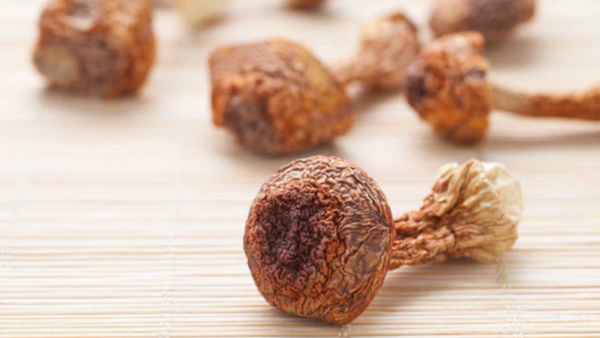
Almond mushroom: The mushroom for a strong immune system and low blood sugar?
The medicinal mushroom almond mushroom is said to have an immune-boosting effect. In this article, you will learn what the almond mushroom is, what ingredients it contains and how it affects the body.
What is almond mushroom?
The almond mushroom ( Agaricus blazei ) is a medicinal mushroom that comes from the Brazilian rainforest. It belongs to the mushroom family (Agaricus) and owes its name to its almond-like aroma.
It is not only used as an edible mushroom in the kitchen, but also specifically as a dietary supplement in the form of extracts or dried powder.
What ingredients does the almond mushroom contain?
The almond mushroom is rich in numerous nutrients. [1] The exact composition varies depending on the origin and processing method.
Proteins
Minerals: zinc , potassium and phosphorus
B vitamins : especially vitamin B2 and vitamin B3
β-Glucans
Triterpenes
Coenzyme Q10
GABA (a neurotransmitter)
Lovastatin (a cholesterol-lowering drug )
Like other mushrooms, the almond mushroom is very rich in β-glucans. β-glucans occur naturally in the cell walls of mushrooms. They are sugar molecules (polysaccharides) that are linked together. However, these are not digestible, which is why they are considered dietary fiber.
The effect of β-glucans on the human body is currently being scientifically investigated. Studies suggest that β-glucans probably have a positive effect on cholesterol levels, lower blood lipid levels and reduce the risk of cardiovascular disease. [2] In addition, β-glucans serve as food for beneficial intestinal bacteria (prebiotics) and can thus improve the intestinal flora. [3]
β-glucans are also said to have an immune-regulating effect, for which there is some scientific evidence. They appear to be able to strengthen the immune system and at the same time have an anti-inflammatory effect.
What does almond mushroom do?
Due to its ingredients, the effects of almond mushroom are currently being scientifically investigated and there are some promising results.
Effect of almond mushroom on the immune system
Some studies suggest that the almond mushroom may strengthen the immune system and have a positive effect on the body's defense system. [4]
Almond mushroom for detoxification
Almond mushroom may potentially support the detoxification system and improve liver function. [5]
Blood pressure
Studies suggest that the almond mushroom may have a blood pressure regulating effect. [6]
Blood sugar
Almond mushroom may be able to regulate blood sugar levels and lower them when needed. [7]
Risks and side effects of almond mushroom
The almond mushroom is very well tolerated. In rare cases, however, it can cause digestive problems, nausea and skin rashes.
Buying almond mushrooms: what you should pay attention to
When it comes to almond mushrooms and other medicinal mushrooms, you should definitely pay attention to quality. Products are often contaminated and heavily loaded with harmful substances.
So make sure that the product has been tested for harmful substances and comes from a German laboratory. A high-quality product is also free of unnecessary additives such as binding, separating, gelling and filler agents and contains vitamin C as a bioenhancer.
As a small thank you for making it to the end of this article, we would like to offer you a 15% voucher for our almond mushroom .
Simply copy the voucher code “MANDEL15+V” and enter it at checkout.
Click here for the product
[1] https://scielo.isciii.es/pdf/nh/v27n2/15_original_05.pdf
[2] https://www.ncbi.nlm.nih.gov/pmc/articles/PMC5618555/
[3] https://pubmed.ncbi.nlm.nih.gov/33864864/
[4] https://pubmed.ncbi.nlm.nih.gov/21128829/
[5] https://www.ncbi.nlm.nih.gov/pmc/articles/PMC3730730/
[6] https://pubmed.ncbi.nlm.nih.gov/24433071/
[7] https://onlinelibrary.wiley.com/doi/full/10.1002/fsn3.1310

Chasteberry: What women’s complaints does it help with?
Chasteberry is an ancient medicinal plant that is used to treat many women's complaints. It is said to relieve menstrual and menopausal symptoms, help with PMS and can even increase libido.
What is chasteberry?
Chasteberry, also known as monk's pepper (lat. Vitex agnus-castus), is a plant that is used in natural medicine to treat various ailments. Chasteberry belongs to the Verbenaceae family and is native to the Mediterranean region. The plant has purple flowers and edible, dark berries.
Ingredients of monk’s pepper
Monk’s pepper is rich in secondary plant substances with pharmacological effects:
Flavonoids , which have antioxidant and anti-inflammatory properties.
Iridoids , which also have anti-inflammatory and antioxidant effects.
Diterpenes , which can inhibit the release of prolactin and thus help with hormonal complaints such as PMS and menstrual cramps.
The exact ingredients of monk’s pepper can vary greatly depending on the variety, time of harvest and processing.
Effects of chasteberry
The effect of chasteberry is due to the fact that it lowers prolactin levels. [1]
Prolactin is a hormone produced in the pituitary gland. It plays an important role in regulating the female reproductive system and is also present in men, but in smaller amounts.
Among other things, a low prolactin level ensures that the body's own progesterone production increases, which in turn counteracts estrogen dominance.
In estrogen dominance, the estrogen/progesterone ratio is not in balance. There is too much estrogen compared to progesterone. This can lead to menstrual disorders such as irregular or heavy periods, as well as premenstrual syndrome (PMS).
Chasteberry lowers prolactin levels by binding the diterpenes it contains to dopamine receptors. This imitates the effect of dopamine. Dopamine is known for its prolactin-inhibiting effect.
The mystery of the double effect
Monk's pepper is known for its libido-enhancing effect, among other things. However, it was also used by nuns and monks in the Middle Ages to suppress female libido. This is why monk's pepper is also known as chaste lamb.
How can this be explained?
In order for chasteberry to inhibit the amount of prolactin, relatively large amounts are needed. In small amounts, chasteberry has the opposite effect: it increases prolactin production.
That is why it is very important to dose monk’s pepper correctly.
Chasteberry for premenstrual syndrome
PMS occurs in the days before menstruation and is accompanied by numerous symptoms such as lower abdominal cramps, headaches and back pain, fatigue and mood swings.
The causes of PMS are not understood in detail, but elevated prolactin levels appear to promote PMS. Therefore, it is logical that chasteberry, with its prolactin-lowering effect, could be helpful. Studies actually suggest that chasteberry can relieve PMS symptoms. [2]
Monk’s pepper for menstrual disorders
There are many different types of menstrual disorders: menstruation can be too light or too heavy, cycles can be too long, too short or simply very irregular. Many women often stop having their periods altogether.
Polycystic ovary syndrome (PCOS) is a common cause of menstrual disorders. Hormonal imbalances, such as those that can occur after stopping taking the pill, can also lead to irregular periods.
In some studies, chasteberry appears to be able to relieve menstrual disorders. [3] However, further research is needed here.
Chasteberry for period pain
Many women suffer from severe pain during menstruation. The contraceptive pill is known to be able to relieve these symptoms. Unfortunately, however, the contraceptive pill is not without side effects and is also a major nutrient thief .
Chasteberry also seems to be able to help with period pain. In one study, the effect was even comparable to the contraceptive pill. [4]
Monk’s pepper for menopausal symptoms
Unfortunately, menopause brings with it numerous symptoms such as hot flashes, sweating, sleep disorders and mood swings, even depression.
During menopause, both estrogen and progesterone levels drop. Progesterone levels often drop significantly more, resulting in estrogen dominance. Estrogen dominance is suspected of promoting menopausal symptoms. Since chasteberry appears to counteract estrogen dominance, it is often used to treat menopausal symptoms. [5]
Take chasteberry
Chasteberry is generally well tolerated and rarely causes side effects. However, digestive problems or headaches can occasionally occur.
Since chasteberry interferes with the hormonal balance, it should not be taken during puberty, pregnancy or breastfeeding.
For therapeutic purposes, chasteberry is used as an extract. The dosage is crucial here: too low a dose can increase the prolactin level and thus have undesirable effects. A high-quality preparation is also free of unnecessary additives such as separating and binding agents, colorings, sweeteners and preservatives.
The chasteberry from Viktilabs is appropriately dosed with 10 mg of 4:1 chasteberry extract. The preparation is developed in a German laboratory according to the highest quality standards.
As a small thank you for making it to the end of this article, we would like to offer you a 15% voucher for our MONKS PEPPER EXTRACT .
Simply copy the voucher code “MOENCH15+V” and enter it at checkout.
Click here for the product
[1] https://www.cjmb.org/uploads/pdf/pdf_CJMB_465.pdf
[2] https://pubmed.ncbi.nlm.nih.gov/29063202/
[3] https://pubmed.ncbi.nlm.nih.gov/32549844/
[4] https://www.cochranelibrary.com/central/doi/10.1002/central/CN-01120278/full
[5] https://www.tandfonline.com/doi/abs/10.1080/09513590701200900

Detox miracle Chlorella: How does the microalgae affect the body?
Chlorella is a green freshwater algae known for its detoxifying properties. Chlorella also contains numerous nutrients such as protein, vitamins, minerals and antioxidants . It is said to have many positive effects on the body.
Let's take a closer look at Chlorella.
Ingredients of Chlorella
Chlorella contains protein, carbohydrates, fiber and fat. The algae is also rich in vitamins, minerals and especially chlorophyll. It also contains traces of beta-carotene and other carotenoids.
The nutrient content varies depending on the type and production process.
Nutrient
Content per g dry weight
Vitamin B1
0.03 – 0.05mg
Vitamin B2
0.3 – 0.5mg
Vitamin B3
2 – 3mg
Vitamin B6
0.1 – 0.2mg
Folic acid
20 – 40 µg
Vitamin B12
1.0 – 2.5 µg
Vitamin C
20 – 60mg
Vitamin E
0.5 – 3.0mg
magnesium
Approx. 15 mg
iron
Approx. 1 mg
potassium
Approx. 55 mg
Calcium
Approx. 30 mg
What does chlorella do?
Due to the numerous vitamins and minerals and the high chlorophyll content, chlorella is said to have various effects.
The effects of chlorella are still being scientifically studied, but there are some promising results.
Chlorella and the immune system
Chlorella contains many nutrients that are important for the immune system : vitamin C , zinc , iron and antioxidants. Antioxidants counteract oxidative stress and inflammation, which can weaken the immune system.
In one study, the concentration of antibodies in saliva increased after supplementing with chlorella. [1] This could mean that pathogens can be better fought off.
Chlorella for detoxification
Chlorella is known for its detoxifying effect . The chlorophyll contained in the algae is said to be primarily responsible for this. Chlorophyll is a natural detoxifying agent that binds harmful substances so that they can be excreted. Chlorella is also said to be able to bind heavy metals. Heavy metals can cause great damage to the body and are not easy to detoxify.
In initial studies, mercury levels decreased in a small group of subjects after taking chlorella. [2] However, this needs to be confirmed by further studies.
Chlorella and triglycerides
At These are so-called blood fats. They are much better markers for cardiovascular risk than cholesterol .
It is not understood in detail how chlorella lowers triglycerides. Scientists suspect that this is due to its high fiber content.
In initial studies, chlorella appeared to be able to lower triglycerides. [3] However, this needs to be confirmed in further studies.
Risks and side effects of chlorella
Chlorella is very safe and is usually well tolerated. In rare cases, chlorella can cause diarrhea, constipation, nausea, or headaches.
Due to the high chlorophyll content, the stool may turn green. However, this is completely harmless.
Buying Chlorella: What you should pay attention to
Unfortunately, chlorella is often heavily contaminated with toxins. Because it binds toxic substances so well, it also absorbs toxins from the environment. Chlorella preparations often contain increased levels of heavy metals.
When it comes to chlorella, you should therefore make sure that it comes from controlled cultivation. Ideally, it should be cultivated in a closed system so that it does not come into contact with pollutants from the environment. It is also referred to as "indoor chlorella".
High-quality preparations are also tested for harmful substances and do not contain any unnecessary additives.
As a small thank you for making it to the end of this article, we would like to offer you a 15% voucher for our Chlorella vulgaris .
Simply copy the voucher code “CHLORELLA15+V” and enter it at checkout.
Click here for the product
[1] https://www.ncbi.nlm.nih.gov/pmc/articles/PMC3182968/
[2] https://www.jstage.jst.go.jp/article/fts/5/3/5_117/_article/-char/ja/
[3] https://www.ncbi.nlm.nih.gov/pmc/articles/PMC4066283/














